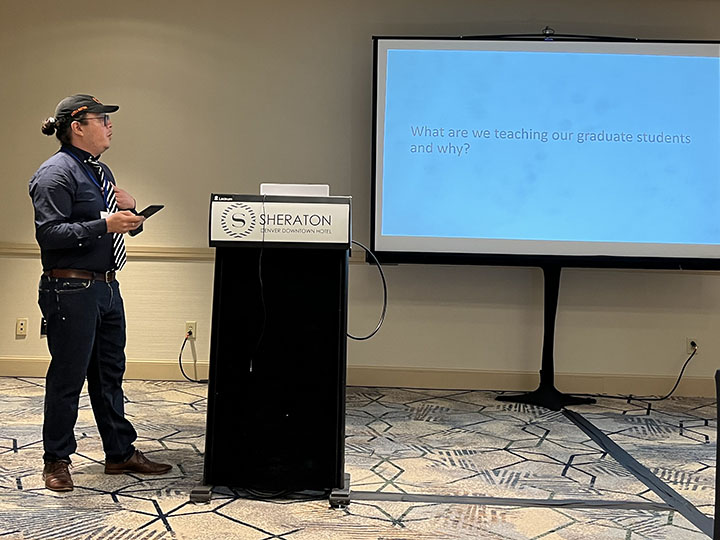
Syracuse University
WRT 302 Digital Writing: Fall 2024
This course uses digital archives and wikis to broaden our understanding of the long-term implications of digital writing. As generative AI continues to develop in complexity, we read from a body of theory to analyze our relationship to digital composing processes.
WRT 307 Professional Writing: Fall 2024, 2022
With a strong emphasis on critical design and social justice, this course considers how genres function in workplace settings broadly conceived. Students are challenged to write using elements of visual and digital rhetorics. Through collaborative workshops, students will practice professional genres that are ethically responsible and communicate clearly.
WRT 304 Indigenous Rhetoric and Writing: Spring 2023
This course complicates our relationships with writing, research, and the living environment. We rhetorically engage the on-going processes of settler colonialism within a variety of contexts such as horticulture, agriculture, ornithology, philosophy, anthropology, historical/master narratives, and Indigenous worldviews.
WRT 205 Critical Research: Spring 2022
This course asks students to take an active role in research. They develop writing projects that engage in ethical research practices with a particular attention to academic style. Students learn to incorporate a variety of sources to support their writing by negotiating their embodied ways of composing with academic genre expectations.
WRT 105 Practices of Academic Writing (FYC): Fall 2022, 2021
This course is an introduction to writing and composition at the college level, also known as First Year Composition. Writing in this course is both a subject of inquiry and the primary activity. Students write, revise, edit, and reflect on their writing and writing processes in a number of academic and creative genres with a particular emphasis on their relationship to language.
The University of New Mexico
English 220 Expository Writing “Post-truth”: Spring 2019
This course is inspired by increasing sociopolitical tensions in the United States and elsewhere. As digital technologies continue to become more integrated into our lives, the search for “truth” in information becomes a significant challenge. Students learn from variety of theory to understand what constitutes knowledge, facts, and proof in our public and private spheres of communication.
English 219 Technical and Professional Communication: Fall 2019, Fall 2018
What is the relationship between technical/professional communication and rhetoric? This course asks students to interrogate assumptions made about common workplace genres by learning elements of rhetorical analysis and rhetorical genre theory. Students will also develop application materials for professional and academic use-cases like a letter of intent and resume.
English 111 Stretch Composition 1: Summer 2019, Fall 2018
This course is the first part of the “stretch” series of composition courses. While first year composition is typically offered as a one semester course, this series stretches a one semester course into two credit bearing courses. Students who take this course will have the same classmates and instructor throughout the series, or an entire academic year. The purpose of this course is to nurture a sustained writing community. Stretch Composition 1 introduces students to academic genres, analyzing them with a focus on their embodied ways of composing.
English 112 Stretch Composition 2: Fall 2019, Spring 2019
This course is the second course of the “stretch” series of composition courses. Strech Composition 2 builds on the first course by asking students to participate in the academic genres that they analyzed in the Stretch Composition 1. Additionally, students will organize group presentations for an undergraduate conference on campus.
English 120 Composition 3: Spring 2018
This course emphasizes academic writing, research, and argumentation. Students design research projects and integrate secondary sources to support their arguments. Additionally, students are highly encouraged to use university archives to learn about primary sources. Students will learn how to make archival pull requests, search digital databases, and navigate other library resources including the stacks and microfilm.
English 110 Accelerated Composition (FYC): Fall 2017
This course, also known as First Year Composition, is a writing intensive course that asks students to both analyze and participate in academic and creative genres. By reflecting on their relationship to language, students learn to negotiate a wide variety of genre expectations. Students are asked to write in-class daily, share, and establish a community that values both writing and writing processes.